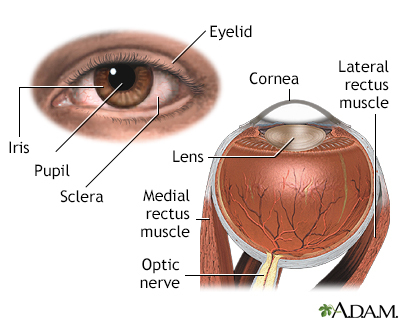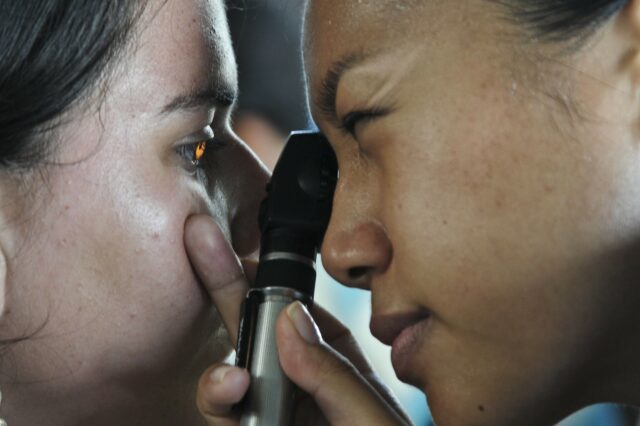Protecting Your Eyes from Your Digital Devices
If you’re reading this, most likely it is on a digital screen. Viewing information on a screen has become a normal part of life. However, it is important to…

Update your location to show providers, locations, and services closest to you.
Night blindness is poor vision at night or in dim light.
Nyctanopia; Nyctalopia; Night blindness
Night blindness may cause problems with driving at night. People with night blindness often have trouble seeing stars on a clear night or walking through a dark room, such as a movie theater.
These problems are often worse just after a person is in a brightly lit environment. Milder cases may just have a harder time adapting to darkness.
The causes of night blindness fall into 2 categories: treatable and nontreatable.
Treatable causes:
Nontreatable causes:
Take safety measures to prevent accidents in areas of low light. Avoid driving a car at night, unless you get your eye doctor's approval.
Vitamin A supplements may be helpful if you have a vitamin A deficiency. Ask your health care provider how much you should take, because it is possible to take too much.
It is important to have a complete eye exam to determine the cause, which may be treatable. Contact your eye doctor if symptoms of night blindness persist or significantly affect your life.
Your provider will examine you and your eyes. The goal of the medical exam is to determine if the problem can be corrected (for example, with new glasses or cataract removal), or if the problem is due to something that is not treatable.
The provider may ask you questions, including:
The eye exam will include:
Other tests may be done:

Cao D. Color vision and night vision. In: Sadda SVR, Sarraf D, Freund KB, et al, eds. Ryan's Retina.7th ed. Philadelphia, PA: Elsevier; 2023:chap 11.
Cukras CA, Zein WM, Caruso RC, Sieving PA. Progressive and "stationary" inherited retinal degenerations. In: Yanoff M, Duker JS, eds. Ophthalmology. 5th ed. Philadelphia, PA: Elsevier; 2019:chap 6.14.
Duncan JL, Pierce EA, Laster AM, et al. Inherited retinal degenerations: current landscape and knowledge gaps. Transl Vis Sci Technol. 2018;7(4):6. PMID: 30034950 pubmed.ncbi.nlm.nih.gov/30034950/.
Fenner BJ, Tan TE, Barathi AV, et al. Gene-based therapeutics for inherited retinal diseases. Front Genet. 2022;12:794805. PMID: 35069693 pubmed.ncbi.nlm.nih.gov/35069693/.
Thurtell MJ, Prasad S, Tomsak RL. Neuro-ophthalmology: afferent visual system. In: Daroff RB, Jankovic J, Mazziotta JC, Pomeroy SL, eds. Bradley and Daroff's Neurology in Clinical Practice. 8th ed. Philadelphia, PA: Elsevier; 2022:chap 16.
If you’re reading this, most likely it is on a digital screen. Viewing information on a screen has become a normal part of life. However, it is important to…

Imagine waking up one morning and noticing images around you slowly starting to fade. According to the American Society of Retina Specialists, more than 15…
